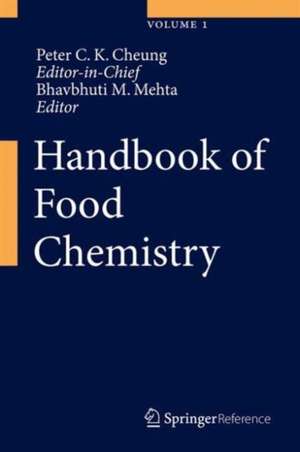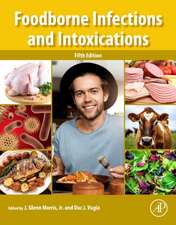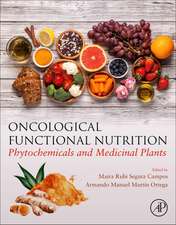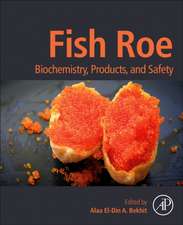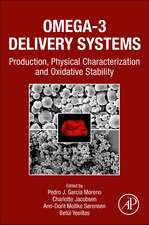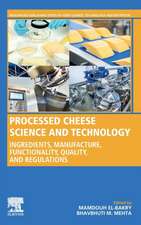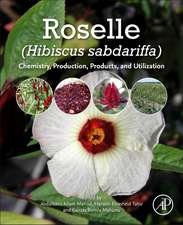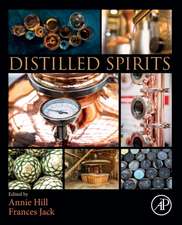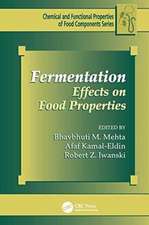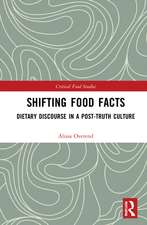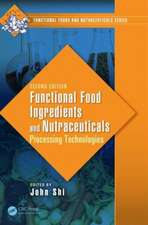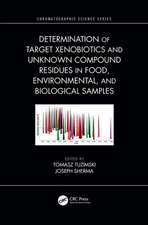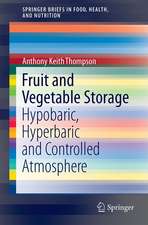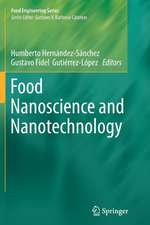Handbook of Food Chemistry
Editat de Peter Chi Keung Cheung, Bhavbhuti M. Mehtaen Limba Engleză Hardback – 16 noi 2015
Preț: 2311.65 lei
Preț vechi: 3041.64 lei
-24% Nou
Puncte Express: 3467
Preț estimativ în valută:
442.35€ • 473.01$ • 368.81£
442.35€ • 473.01$ • 368.81£
Carte tipărită la comandă
Livrare economică 14-21 aprilie
Preluare comenzi: 021 569.72.76
Specificații
ISBN-13: 9783642366048
ISBN-10: 364236604X
Pagini: 1200
Ilustrații: XXIII, 1173 p. 209 illus., 36 illus. in color.
Dimensiuni: 155 x 235 x 55 mm
Greutate: 2.47 kg
Ediția:1st ed. 2015
Editura: Springer Berlin, Heidelberg
Colecția Springer
Locul publicării:Berlin, Heidelberg, Germany
ISBN-10: 364236604X
Pagini: 1200
Ilustrații: XXIII, 1173 p. 209 illus., 36 illus. in color.
Dimensiuni: 155 x 235 x 55 mm
Greutate: 2.47 kg
Ediția:1st ed. 2015
Editura: Springer Berlin, Heidelberg
Colecția Springer
Locul publicării:Berlin, Heidelberg, Germany
Public țintă
ResearchCuprins
Chemical composition of food and food commodities.- Chemical, physical and functional properties of food components.- Chemical and functional properties of food ingredients/additives in food products.- Nutritional and toxicological aspects of the chemical changes of food components/nutrients during processing.- Chemical and toxicological aspects of food contamination.- Culinary chemistry.- Principles of chemical analysis of food components.- Chemistry of bioactive ingredients in functional foods and nutraceuticals.- Chemistry of food nanotechnology.
Notă biografică
Prof. Peter C.K. Cheung obtained his BSc. (Hons.) degree from the University of Hong Kong, majoring in chemistry. He completed a master’s degree in food and drug chemistry and a Ph.D. degree in food carbohydrates from the University of New South Wales in Australia. He is currently the Programme Director of Food and Nutritional Sciences in the School of Life Sciences at the Chinese University of Hong Kong. Professor Cheung’s expertise is on the chemistry and biology of bioactive food components. His research is focused on the structure and function of dietary fibre. He has particular interest in the chemical structure and biological functions of mushroom and fungal polysaccharides, especially their antioxidant, antitumor, immunomodulatory and prebiotic activities. Professor Cheung is serving as the associate editor of Bioactive Carbohydrates and Dietary Fiber and the editorial board members of the International Journal of Medicinal Mushrooms, Journal of Agricultural and Food Chemistry, Journal of Food Composition and Analysis, as well as Food Science and Human Wellness. He is the author or coauthor of over 100 SCI publications and is the editor of the book Mushroom as Functional Foods.
Dr. Bhavbhuti M. Mehta is an Assistant Professor in the Dairy Chemistry Department, Sheth M.C. College of Dairy Science at Anand Agricultural University, Anand, Gujarat, India. He did B. Tech. (Dairy Technology); M.Sc. (Dairying) i
n the field of dairy chemistry as a major subject and dairy microbiology as a minor subject; as well as Ph.D. in the field of dairy chemistry as a major subject and dairy technology as a minor subject from Sheth M.C. College of Dairy Science, AnandAgricultural University, Anand, Gujarat, India. He teaches various subjects on dairy and food chemistry at undergraduate as well as post-graduate levels. His major specialty is on various physico-chemical changes (process-induced changes) taking place during processing of milk and milk products and to food chemistry in general. His research interests also include lipid oxidation and its prevention (natural antioxidants), methods to measures various oxidative deterioration, functional food ingredients and neutraceuticals (e.g., milk fat globule membrane), natural alternatives to food additives (e.g., ice-structuring proteins in ice cream and frozen desserts), role of various constituents in dairy and food products (viz. flavors, off-flavors, texture, structure, etc.), chemistry and technology of milk and dairy products (e.g., cheese, yoghurt, fat-rich dairy products, concentrated milks, dried milk, ice cream) in particular and food products in generals. He is an associate editor of the International Journal of Dairy Technology, an editorial board member and a referee/reviewer in a number of journals. He has published numbers of technical/research/review papers/chapter/booklet/abstract/monograph in national as well as international journals, seminars, and conferences. He has edited one book published by the CRC Press, Taylor & Francis Group.
Dr. Bhavbhuti M. Mehta is an Assistant Professor in the Dairy Chemistry Department, Sheth M.C. College of Dairy Science at Anand Agricultural University, Anand, Gujarat, India. He did B. Tech. (Dairy Technology); M.Sc. (Dairying) i
n the field of dairy chemistry as a major subject and dairy microbiology as a minor subject; as well as Ph.D. in the field of dairy chemistry as a major subject and dairy technology as a minor subject from Sheth M.C. College of Dairy Science, AnandAgricultural University, Anand, Gujarat, India. He teaches various subjects on dairy and food chemistry at undergraduate as well as post-graduate levels. His major specialty is on various physico-chemical changes (process-induced changes) taking place during processing of milk and milk products and to food chemistry in general. His research interests also include lipid oxidation and its prevention (natural antioxidants), methods to measures various oxidative deterioration, functional food ingredients and neutraceuticals (e.g., milk fat globule membrane), natural alternatives to food additives (e.g., ice-structuring proteins in ice cream and frozen desserts), role of various constituents in dairy and food products (viz. flavors, off-flavors, texture, structure, etc.), chemistry and technology of milk and dairy products (e.g., cheese, yoghurt, fat-rich dairy products, concentrated milks, dried milk, ice cream) in particular and food products in generals. He is an associate editor of the International Journal of Dairy Technology, an editorial board member and a referee/reviewer in a number of journals. He has published numbers of technical/research/review papers/chapter/booklet/abstract/monograph in national as well as international journals, seminars, and conferences. He has edited one book published by the CRC Press, Taylor & Francis Group.
Textul de pe ultima copertă
This handbook is intended to be a comprehensive reference for the various chemical aspects of foods and food products. Apart from the traditional knowledge, this book covers the most recent research and development of food chemistry in the areas of functional foods and nutraceuticals, organic and genetically modified foods, nonthermal food processing and molecular gastronomy, as well as nanotechnology. This handbook contains both the basic and advanced chemistry both for food research and its practical applications in various food related industries and businesses. This book is appropriate for undergraduates and postgraduates in the academics and professionals from the various disciplines and industries who are interested in applying knowledge of food chemistry in their respective fields.
Caracteristici
Provides a quick reference to facilitate the understanding of the chemical aspect of all important food areas Involves some very fast growing areas such as functional foods and nutraceuticals, unconventional food processing, food safety and toxicology as well as nanotechnology Contains both the basic and advanced chemistry both for food research and its practical applications in various food related industries and businesses
